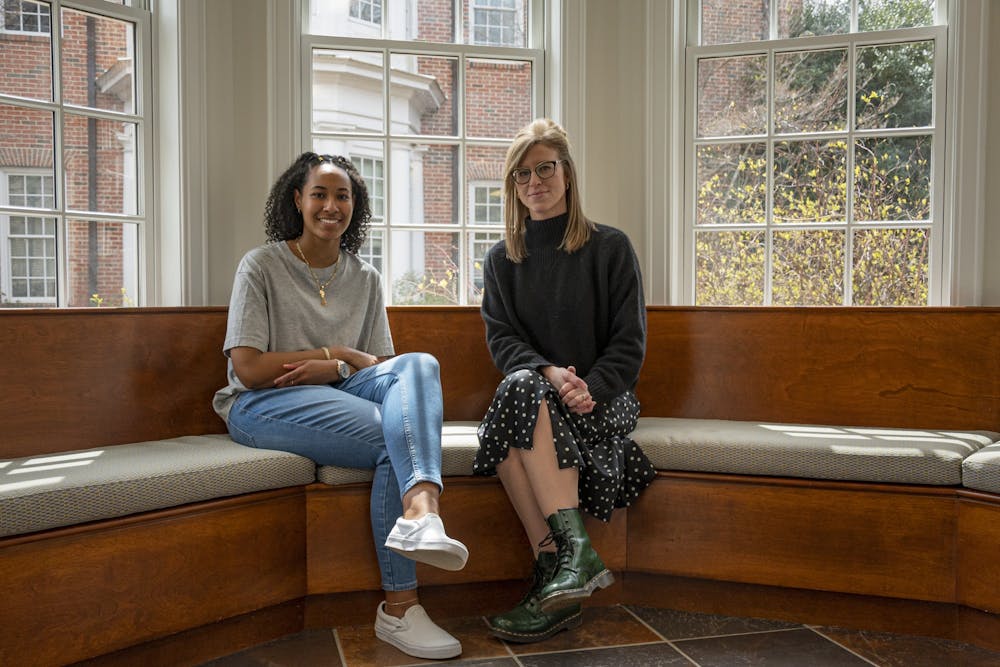When Dillan Bono-Lunn brought up the idea for the Public Policy Think Tank at a meeting, it was met with unanimous praise. The political science and policy studies professor presented the idea to the policy studies advisory board and credited the proposal to her advisee, junior Amaya Gaines.
Beginning in fall 2022, Public Policy Think Tank will be a student organization and two-credit course. Gaines is the founder of the organization and Bono-Lunn will serve as the faculty adviser and instructor of the class.
Elon’s policy studies department defines public policy as concerned with solving problems through government intervention. A think tank is an interdisciplinary research institute that publishes articles, analysis and studies on a topic. It also often provides commentary or advocacy.
“This is a niche that goes unfulfilled,” Bono-Lunn said. “This is a way we can give policy students in particular, but also Elon students across the campus, an opportunity to engage in timely, accessible policy research. So this is just a slam dunk in terms of experiential learning.”
As a part of the think tank, students will produce and review policy-relevant work and publish a variety of research — from policy briefs and memos to blogs and infographics. The think tank will also host events and invite guest speakers. The organization will be entirely run by students, and the class will supplement their work. Course credit also offers an incentive for students to join.
For Gaines, the think tank represents more than an expansion of the political science and policy studies department: it’s also a way to further initiatives of diversity, equity and inclusion at Elon.
“If you look at the discipline of political science and public policy, some of the most impacted people are Black and brown folks, people across the gender spectrum, so on and so forth,” Gaines said. “But they're some of the least represented voices in policy discourse, research and whatnot.”
To remedy this issue, Gaines said she hopes the think tank will be a way for students to step outside of the Elon bubble with their policy research, publishing work that will help students understand government systems, policies and laws that create different conditions for people with different and intersecting identities.
This is something Gaines knows can be effective; she did her own public policy research last year as a 2021 Lumen Scholar. Gaines’ Lumen project, “Policy Solutions Waiting to Be Seen: Applying Intersectionality Policy Process Analysis to State Anti-Poverty Programs,” gave her the opportunity to research and analyze where the Temporary Assistance for Needy Families policy has failed people with intersecting identities as a Black woman herself.
Gaines started thinking about public policy research as a freshman. After submitting a proposal for a project in her Global Experience class, she received specific feedback from her professor on Moodle encouraging her to apply for the Lumen Prize.
“I literally couldn't imagine myself doing such significant research and getting significant funding as an undergrad,” Gaines said. “I knew I wanted to create research that contributed to a discourse about what it means to experience different policy level issues, and how that impacts your lived experience.”
The summer after working on her Lumen project, Gaines started looking into how policy research is published at other universities. Using the University of North Carolina Chapel Hill Roosevelt Institute and the University of Chicago Paul Douglas Institute as examples, two student-run think tanks, she thought, why can’t Elon house a similar institute of its own?
Bono-Lunn and Gaines have worked together for almost two full academic years. Last semester, when Gaines brought up her idea for the think tank, Bono-Lunn told her to write up a blurb on what she wanted to see at Elon so that Bono-Lunn could present it to the advisory board for her. From there, it was a matter of implementing it at Elon.
The initial faculty response to her idea surprised Gaines, not because she didn’t believe in the think tank, but because implementing the idea would have a lasting effect on the department and Elon as a whole. As she’s gone through the process of planning the think tank, Gaines said her main emotion has been excitement.
As the founder, Gains said that students can join the organization, register for the class or do both. There is no prerequisite for or cap size on the class.
In addition to Gaines’ work, which is particularly visible to her because of their work together, Bono-Lunn said there is already great student policy research on campus that underscores the value of housing a public policy think tank on campus.
“Getting to see her present some of her initial findings and see her and other students in class present their policy research, it's really striking how there's so much valuable work, policy relevant work that students at Elon generate,” Bono-Lunn said.


